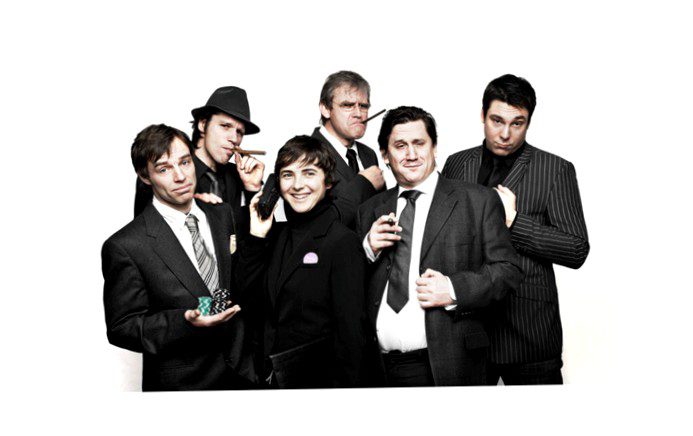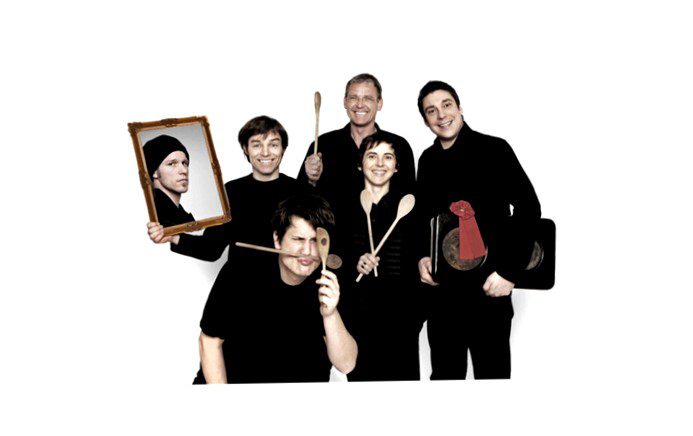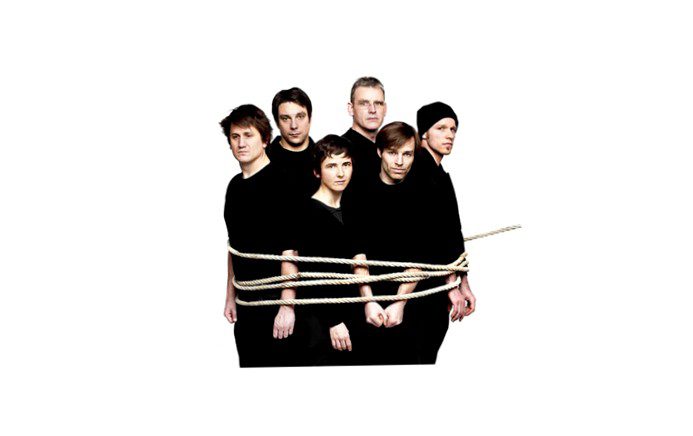Unword of the year
Works council addiction: scandalous defamation of representation of workers' interests.
In the program "Monitor" (ARD 14.5.2009), an employee of a home improvement chain reported that this word is used by department managers when an employee wants to transfer from a store with a works council to a store without a works council.
There, he could be reproached for the fact that his previous reliance on an employee representation endangered the hiring. The perception of employee interests "disturbs" many companies, but calling it a "plague" is at least a linguistic low point in dealing with wage-earners.
Fluchtlingsbekampfung: Military paraphrase of the defense against refugees; Chancellor Merkel.
Intelligent weapons systems: concealment of high-tech ammunition, even in the official company name of the manufacturer.
Image rights: © Unwort Bilder e.V. | www.UNWORD PICTURES.de
2008

Distressed banks: The relationship between the causes and consequences of the global economic crisis is turned upside down. While national economies are in dire straits and taxpayers have to help pay for billions in loans, the banks and their financial policies, which caused the crisis, are stylized as victims.
The occasional counter-argument to the choice of a non-word, that "distressed" is a technical term as in "non-performing loans," is in vain. Because the combination of "non-performing" and "banks" loses its claim to be specific to a particular subject. Rather, the phrase speculates on the pitying everyday language meaning of "needy".
Pensioners' democracy: When pensions were to be increased by a full 1.1%, former German President Roman Herzog, himself a recipient of a hefty pension, painted a horror scenario of a state, a pensioners' democracy, in which "the old plunder the young.".
Karlsruhe tourists: defamation of citizens who repeatedly appeal to the Federal Constitutional Court over the constitutionality of laws – by the chairman of the police union R, of all people. Wendt.
Image rights: © Unwort Bilder e.V. | www.UNWORD PICTURES.de
2007

Home-raising bonus: The word defames parents, especially women, who raise their children at home instead of using a daycare center.
The term "Herdpramie" has been chosen as the Unword of the Year 2007. Especially annoying is the attempt to degrade all women – including those who interrupt or give up their careers for the sake of raising children – to "home from home.
It would be just as reprehensible to defame the financing of daycare education as an "emancipation subsidy". In the meantime there is a whole word field, which lets the defamation intention likewise become clear. This includes u. a. the variants "Aufzuchtpramie", "Gluckengehalt" and "Schnapsgeld".
Climate-neutral: The attempt to use this term to promote an expansion of air traffic or an increase in other CO2-containing technologies is criticized, without it being made clear how these climate burdens are to be "neutralized.
degenerate: euphemism for art and culture without religious affiliation.
Image rights: © Unword images e.V. | www.UNWORD PICTURES.de
2006

Voluntary departure: Term used by law and authorities when rejected asylum seekers are released from German detention centers, so-called "deportation centers," or "deportation centers. Departure centers, return to their countries of origin after intensive "counseling," the voluntary nature of which is doubtful in many cases.
Voluntary departure is, in the opinion of the Unwort jury, one of the unfortunately numerous unwords related to the treatment of asylum seekers (z. B. the unwords of 1992 and. 2002 residence-terminating measures in the Basic Law Art. 16a and exit center for deportation detention centers or the authorities' formulation child-friendly deportation).
Voluntary departure means, in distinction to the official term deportation, which includes coercive measures, the consequence of the "intensive counseling" of rejected asylum seekers in the so called "voluntary departure". exit centers to leave the Federal Republic again by themselves after all. The voluntariness of such a departure may be doubted in many cases.
Victims of consumerism: paraphrase for models who have to live up to an ideal of beauty in consumer society by slimming down.
Envy debate: defamation of public discussion about exaggerated executive salaries.
Image rights: © Unwort Bilder e.V. | www.unword-pictures.en
2005
Layoff productivity: gains from a company's production output after previously laying off large numbers of employees deemed "redundant".
Layoff productivity means a constant, if not increased, work and production output, after previously laying off numerous employees considered "superfluous".
It thus disguises the usually excessive additional workload of those who were still able to keep their jobs, which is often also described with the equally euphemistic word of "work intensification. But this term is also used to shamefully conceal the economically harmful consequences of personnel savings, i.e. the financing of unemployment.
Honor killing: Unacceptable invocation of an archaic "family honor" to justify the murder of a mostly female family member.
Bombenholocaust: Disgusting paraphrase of the destruction of Dresden, with which the murder of millions in the actual Holocaust is to be played down.
Longevity risk: Insensitive technical term for the insurance risk that arises from the fact that insured persons live longer than calculated; cf. Also "death benefit".
2004
Human capital: Degrades people to only economically interesting quantities.
The use of this word from economic jargon is increasingly spreading to non-specialist areas, thus promoting the primarily economic assessment of all conceivable aspects of life, which is also increasingly influencing current politics. Human capital degrades not only workers in companies, but people in general to only economically interesting variables. As early as 1998, the jury reprimanded human capital as a euphemism for raising children. The current occasion is the inclusion of the term in an official declaration of the EU, which uses it to define the "abilities and skills as well as the knowledge embodied in persons" (August 2004).
General opinion on the unword of the year "human capital":
In the meantime, the Unwort jury has been confronted with so many reactions to its choice of "human capital" as the Unwort of the Year that it is impossible to reply personally to every letter.
To those who have expressed their agreement we would like to express our sincere thanks! In some of these letters very profound arguments and concrete information are given, which only strengthen our criticism of the economization of all possible aspects of life, which we wanted to exemplify using the key term "human capital". In particular, it is pointed out – also by experts – how little the pure representatives of the "human capital" theory are apparently still aware of the limited scope of their approaches.
The critics should be told the following: The venerable tradition of the technical term "human capital", to which the opponents of our choice of the Unwort repeatedly refer, was and is very well known to the Unwort jury. It was also once called (somewhat less "calculating") "intellectual capital" (cf. Adam Smith u. a.). We were and are also aware of the fact that this term was intended to appreciate human skills and abilities in addition to physical and financial capital. Whether "human capital" is now more than a nice metaphor, however, remains highly questionable.
In view of the unison outcry from the experts, we are now asking ourselves whether we have not hit a nerve with the word criticism even of the "human capital" theory and its social relevance. For with what certainty should the human share in the performance of companies and of society as a whole, which is to be promoted by education and training, be calculated, if in economic policy and practice the so-called "intellectual capital" is used as the basis for the calculation?. "Human capital" of now more than five million and with each additional mass layoff is thrown in the garbage? What does theory have to do with reality?? The reality is that "human capital" is basically subordinated to "shareholder value". Also, the rampant rewriting of workers as "human resources" (occasionally even as "personnel rationalization reserve") is more than revealing. This in no way saves the supposedly still "humane" character of "human capital". Also, the experts should for once open themselves to a debate on somewhat broader anthropological questions about the value of human beings, which cannot be calculated only with euros and cents.
Hints that "human capital" has already been criticized "significantly" by Marxists, who want to put the Unwort jury into a certain ideological corner and thus discredit it, are just as unworthy of a scientific discussion as the outbursts of individuals that we are "intellectual gravediggers of our national economy" (FAZ) u. a. Such reactions are actually self-explanatory.
Welcome centers: linguistic trivialization of reception camps for African refugees; this word formation is congenial to the already official name departure center for detention centers for deportees.
Air pollution rights: Not only an ecological absurdity, the word also contributes to the idea that "greenhouse gas emissions" are unobjectionable because their trade is legally regulated.
2003
Tatervolk: Fundamentally unacceptable accusation of collective guilt; as a potentially possible accusation against Jews in Martin Hohmann's case, simply anti-Semitic.
The occasion for the criticism was the use of this word in the controversial speech of the Member of the Bundestag Hohmann. This term is already fundamentally reprehensible, since it makes a whole people responsible for the misdeeds of smaller or larger groups of perpetrators without any exception, i.e. accuses them of collective guilt. The connection of this term with "the" Jews in particular is a current proof of the still effective anti-Semitism. Already in the religious, anti-Judaic origin of this attitude, the people of the Jews were held collectively responsible for the death of Jesus Christ and even branded as "murderers of God".
More detailed justification of the Unwort criticism of Homann's "perpetrator people" remarks:
Since the reasons for a choice of a nonword in the media can only be given in abbreviated form, the reasons for the choice of "Tatervolk" as the nonword of the year 2003 will be given in more detail below.
1. The Unwort-Jury criticizes the use of the term ""Tatervolk" (which unfortunately has been in use for a long time, as numerous evidences before 2003 prove) in principle:
"Perpetrator people" contains the accusation of collective guilt, which cannot be leveled against any people on earth. Applied against the German people, this term almost automatically includes those persecuted by the Nazis and the resistance fighters in this accusation (or excludes them from the German people)!). Politically unsuspicious persons such as the first Federal President, Theodor Heub, rightly turned against the collective guilt theory soon after 1945. As with hardly any other unword chosen by us, the word "perpetrator people" must therefore be generally considered reprehensible, by whomever and against whomsoever it is brought into the field.
2. The use of the term in Martin Hohmann's speech was the cause of a current criticism because this speech proves an infamous dialectic whose aim can only be described as anti-Semitic:
The rhetorical trick of Hohmann is that he does not simply reject the collective accusation that the Germans were a "perpetrator people". No, he is looking for a "parallel" in order to level the NS-crimes, where one "could" consider (with cleverly used subjunctive), if the collective accusation does not also fit to them. And he "finds" this parallel in crimes committed by Jews, of all people – not by Khmer Rouge, Hutus, or Tutsis, for instance! The fact that he then turns away from this not accidentally inserted, factually absurd "parallel" again and graciously absolves "the" Jews from the insinuation he himself invented, is the basis for the conclusion he suggests: "The Germans were also no worse than the Jews."
3. Alone the consideration, the Jews one could if necessary. The term "the" Jews, which is also used to describe "the perpetrator people," fits seamlessly into the tradition of an anti-Semitic, even anti-Judaic collective accusation against "the" Jews that is well over a millennium old. In the beginning there was the Christian accusation that "the" Jews had murdered Jesus Christ and were thus "murderers of God".
Supply optimization: glossing over service reductions, such as shutting down rail lines; similar to "mailbox optimization".
Deviant: discrimination against members of the Bundestag who put conscience over faction/coalition constraints.
2002
Ich-AG: Reduction of individuals – as a joint-stock company? – on linguistic stock exchange level.
This word composition from the "Hartz paper" already suffers factually from ridiculous illogic, since an individual cannot be a corporation. Even as an ironic image, the word is unacceptable, since current unemployment is hardly compatible with this kind of humor.
The decisive factor for the choice, however, was the downgrading of human fates to a linguistic stock market level. Ich-AG is thus one of the increasing examples of the use of linguistic cosmetics to gloss over difficult social and sociopolitical issues.
Departure center: official term for collective camps from which rejected asylum seekers are deported.
Cell pile: Linguistic reification of bioengineers for a human embryo.
2001
God warriors: self- and foreign designation of Taliban and El Qaeda terrorists.
This self- and foreign designation of the Taliban and El Qaeda terrorists is often uncritically adopted by the media. Especially the use in acoustic media often lacks the distance to this pseudo-religious claim. No belief in a god, no matter what religion, can justify war or even terrorist attacks.
Crusade: Pseudo-religious dressing up of warlike retaliatory measures; U.S. President George W. Bush.
Top terrorists: trivializing and positivizing designation of Osama bin Laden.
Therapeutic cloning: Doubtful word composition to justify manipulations of the human genome against diseases/for therapies in the not foreseeable future.
Profit warning: Factually incorrect term used by shareholders to warn of lower than expected profits.
2000
National liberated zone: cynically hero-izing paraphrase of a region terrorized by right-wing extremists.
This paraphrase of right-wing extremist terrorized areas and places is common in the eastern states, v. a. in Brandenburg and Saxony, has not only been known since 2000, but has gained nationwide attention in the course of a more general awareness of extremist dangers from the right in the last year. Since this term is also used in radio, it often lacks the distancing quotation marks as a quotation word, which means that this unword could also spread as a "neutral" term. (With similar justification, the undistancedly quoted Unword of the Year 1992 "ethnic cleansing" was chosen.).
This terminology is cynical in two ways: on the one hand, it heroizes an extremist and violent sectarianism as "national" (which should be repugnant even to national-minded people), on the other hand, it passes off the persecution of people as "liberation" and is thus on a par with the unword of the year 1991, "auslanderfrei" (free of foreigners), which was modeled on the unword "judenfrei" (free of Jews). The variant "tick-free zone" equates people with vermin (cf. H. D. Schlosser, Lexicon of Unwords, Gutersloh 2000, pp. 72 and 87).
Overcapacity employees: reduction of employees to be laid off to purely managerial sizes.
Mechanically recovered meat: respectable-sounding name for slaughterhouse waste, particularly inappropriate when BSE is suspected.
"Dirt Away!": CDU slogan in Darmstadt, which was also directed against "unpopular" people.